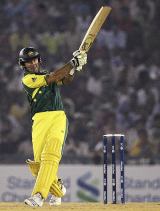Why it has been fun this time
The Champions Trophy has been fun, mainly because it has been unpredictable.
Tim de Lisle
31-Oct-2006
|
|

|
The other night, outside Baker Street station, I bumped into the
Guardian's sports diarist, Paul Kelso. After a few minutes we somehow
got on to the subject of cricket. "The Champions Trophy," he said, "has
been good fun, hasn't it?" My instinct was to disagree - that, after
all, is what fellow journalists are for. But then it dawned on me that
he had a point.
It has been fun, mainly because it has been unpredictable. Hardly
anyone would have guessed that the semi-final line-up would include not
one Asian side. It's like a last four at Wimbledon, with the two top
seeds (Australia and South Africa) joined by two surprise packets (New
Zealand and West Indies). And although these two remain the outsiders,
both of them, unlike most of those plucky tennis players, do have a
chance of lifting the trophy. New Zealand have some form as a thorn in
the Aussies' side, and West Indies, who giant-killed Australia, must be
able to do the same to South Africa - though they still don't look more
than an average team. If they do go all the way for the second time
running, they will have climbed every mountain.
So what is the tournament's secret? Mainly, it's been the pitches,
which have been quite untypical of both one-day cricket and the
subcontinent. Sporting and quixotic, they have behaved as if determined
to right the imbalance between batsmen and bowlers. They have been so
variable that gameplans have come undone and matches have been won or
lost by individuals showing the ability to adapt, from Runako Morton to
Damien Martyn. It's been a series of exams that the students couldn't
easily cram for.
|
|
Improvisation has been rewarded, but experimentation has been punished
- both Duncan Fletcher and Greg Chappell, with hindsight, would surely
have opted to mess around less with their line-ups and batting orders.
Anil Kumble would have won matches; Andrew Flintoff, feeling his way
back from a major injury, would have been happier in his natural
habitat at number six.
The pitches are not the only factor. Partly it's that it is a long(ish)
time since the big eight nations were gathered in one place - the last
time was two years ago, when the Champions Trophy was held in England,
and that didn't really take off. Partly it's that this tournament
happens to fall at an interesting point in the arc of some great
careers. Brian Lara is hanging in there, and has typically mixed
failures with the ability to make runs when they are most needed.
Sachin Tendulkar, who has already done more batting than anyone else in
international history, has turned back the clock. Glenn McGrath has
been raging against the dying of the light, quite effectively.
Mainly it's that there aren't any minnows, or haven't been since
Zimbabwe and Bangladesh crashed, predictably, out of the qualifying
round. The World Cup has become a minnowfest: half the matches are
mismatches. In the Champions Trophy, you don't have to endure Sri Lanka
v Canada in order to enjoy India v Australia. The Champions Trophy is
like the Super Whatevers (six last time, eight this) without the long
tedious preamble. And with England involved.
Which doesn't mean the Champions Trophy is entirely a good thing. I
wrote a few weeks ago that it was misnamed, mistimed and misconceived,
and at least two of those still hold true. It's misnamed because a team
doesn't have to be a champion to take part. It's mistimed because it
comes too close to the World Cup: some of the thunder being heard in
India at the moment should really belong to West Indies 2007.
As for misconceived, well, it certainly looks better than it did a
month ago. But that could be accidental, as the main factor, the
unorthodox groundsmanship, does not appear to have been deliberate. The
Champions Trophy still has big flaws. It is too money-driven, too
forced. It is still squished uncomfortably into the calendar. Its
qualification stage is too long, relative to the main tournament. And
it is still a shocker in terms of environmental impact - made worse
this time by the dismal decision to use chemicals to glue pitches
together and even to undo the dew. Cricket needs to work with nature,
not against her.
Tim de Lisle is a former editor of Wisden. His blog is
https://blogs.cricinfo.com/ashesbuzz
and his website is https://www.timdelisle.com